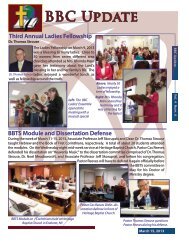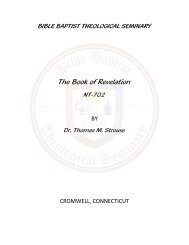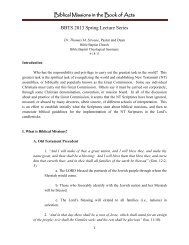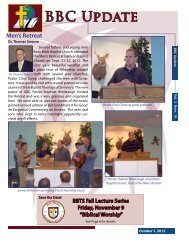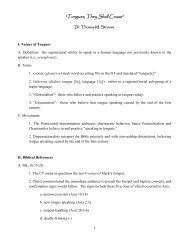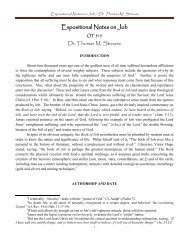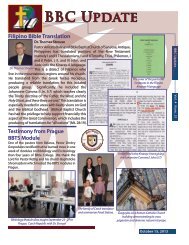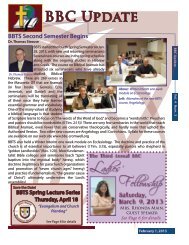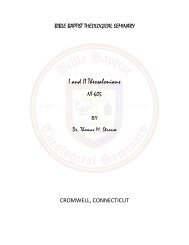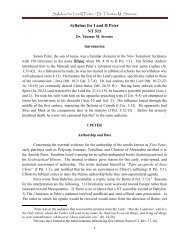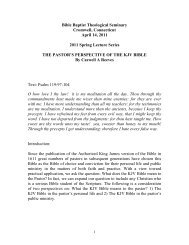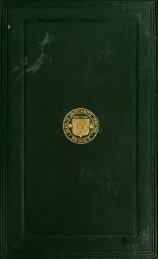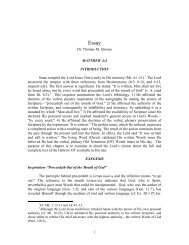Commentary on Luke's Gospel with Emphasis on Medical Terms
Commentary on Luke's Gospel with Emphasis on Medical Terms
Commentary on Luke's Gospel with Emphasis on Medical Terms
You also want an ePaper? Increase the reach of your titles
YUMPU automatically turns print PDFs into web optimized ePapers that Google loves.
As Jesus identified <strong>with</strong> the forerunner to the Messiah by receiving his baptism, the Holy<br />
Ghost descended up<strong>on</strong> Him like a dove, and the Father voiced His pleasure in His becoming a<br />
Baptist. 19 The Lord Jesus Christ commenced His ministry <strong>with</strong> His public baptism, at the age of<br />
thirty. His pedigree started <strong>with</strong> his legal parent, Joseph.<br />
c) The Genealogy of Jesus (3:22-38)<br />
Luke traced the lineage of Jesus Christ back through his legal guardian Joseph, to Heli, to<br />
Abraham, and ultimately back to Adam, the s<strong>on</strong> of God. Luke focused <strong>on</strong> Jesus’ physical<br />
genealogy whereas Matthew focused <strong>on</strong> His royal genealogy through David.<br />
MEDICAL TERMS IN CHAPTER THREE<br />
1. v. 3 “remissi<strong>on</strong>” (a;fesin); Luke used the noun 10x out of 17x in the NT; it refers to the<br />
remissi<strong>on</strong> of illness—Aretaeus. 20<br />
2. v. 14 “violence” (diasei,shte); Luke used this hapax which could refer to the procedure of<br />
physically agitating a patient—Hippocrates.<br />
3. v. 20 “added” (prose,qhke); Luke used it 13x (e.g., 12:25) out of 18x, referring to the<br />
additi<strong>on</strong>al applicati<strong>on</strong> of remedies to the patient, per Hippocrates and Galen.<br />
SUMMARY OF CHAPTER FOUR<br />
(The Lord’s Inaugurati<strong>on</strong> of Ministry [4:1-13])<br />
d) The Temptati<strong>on</strong> of the Lord (4:1-13)<br />
The Spirit of God led Christ to be tempted through forty days of fasting by the devil.<br />
Three times the devil tempted Him and three times the Lord resp<strong>on</strong>ded <strong>with</strong> Scripture (cf. Eph.<br />
6:17). He targummed (cf. Ezr. 4:7) the Book of Deuter<strong>on</strong>omy thrice (Dt. 8:3; 6:13, and 16), and<br />
Satan resp<strong>on</strong>ded <strong>with</strong> the misinterpretati<strong>on</strong> of Ps. 91:11-12. He defeated the devil in this<br />
spiritual sword fight and the enemy left the Savior.<br />
(The Lord’s Influence in Galilee [4:14-9:50])<br />
a) His ministry in the Synagogue (4:14-30)<br />
The Lord Jesus Christ went to the synagogue in Nazareth and read from Isa. 61:1-2a. 21<br />
He gave His interpretati<strong>on</strong> of this messianic passage, indicating that He was the fulfillment. The<br />
Lord explained that he had fulfilled Isaiah’s predicti<strong>on</strong>, and that <strong>on</strong>ly the believing remnant of<br />
the widows and heathen received His forerunners, Elijah and Elisha. This caused their anger and<br />
19 The Triune God was present at Jesus’ baptism.<br />
20 Unknown other by his works, Aretaeus probably lived in the first century under the reign of<br />
Nero. He wrote eight works of which De causis et signis acutorum morborum was <strong>on</strong>e.<br />
21 Christ did not say that “the day of vengeance” was occurring because He was not ushering in<br />
the Tribulati<strong>on</strong> at that time.



